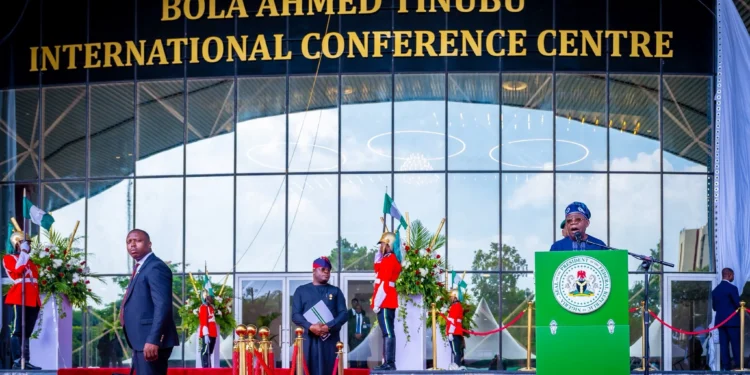Prominent businessman and social commentator Isaac Fayose has launched a scathing attack on the Federal Government’s decision to spend ₦39 billion renovating the Abuja International Conference Centre, condemning the project as misplaced priorities during Nigeria’s economic hardship.
Fayose specifically called out FCT Minister Nyesom Wike and President Bola Ahmed Tinubu over the massive expenditure on the facility, which was originally constructed for ₦240 million in 1991 during General Ibrahim Babangida’s administration. The vocal critic described the renovation project as “ego construction” that prioritizes personal branding over national development needs.
“The ICC was built from the ground up in 1991 with just ₦240 million—a full, functional national monument,” Fayose stated. “Now in 2025, ₦39 billion is being used not to build, but simply to renovate the same structure.”
The social commentator questioned the economic justification for such massive spending on a single renovation project while millions of Nigerians struggle with the effects of inflation and economic hardship. He argued that the expenditure represents a fundamental misalignment of government priorities during a period when citizens are facing severe financial challenges.
“This isn’t about national development or preserving legacy,” Fayose declared. “This is about rewriting history with paint, bricks, and personal branding.” His criticism appears to reference the facility’s renaming to the Bola Ahmed Tinubu International Conference Centre, which he views as part of a broader pattern of self-glorification by the current administration.
Fayose emphasized that his concerns extend beyond the financial implications of the project, highlighting what he sees as deeper issues with the government’s value system and decision-making processes. He warned that the renovation project reflects troubling priorities that disconnect the leadership from the realities facing ordinary Nigerians.
“There’s a deeper problem here,” Fayose cautioned. “It’s not just about the money—it’s about what we value as a nation. While people are struggling to survive, we are spending billions on ego and self-glorification.”
The businessman’s criticism comes at a time when Nigeria is grappling with significant economic challenges, including high inflation rates, currency devaluation, and widespread poverty. Many citizens have expressed frustration with government spending on what they perceive as non-essential projects while basic infrastructure and social services remain inadequate.
The original Abuja International Conference Centre was built as part of Nigeria’s preparations to host international events and conferences, serving as a symbol of the country’s aspirations for global engagement. The facility has hosted numerous significant events over the decades, including African Union summits, ECOWAS meetings, and other continental gatherings.
However, Fayose’s criticism reflects growing public scrutiny of government expenditure priorities, particularly regarding projects that appear to focus on prestige rather than addressing immediate citizen needs. His characterization of the renovation as “ego construction” resonates with broader concerns about governance accountability and resource allocation.
The renaming of the facility to honor the current president has added another layer of controversy to the project, with critics arguing that such moves represent inappropriate use of public resources for personal glorification. Supporters of the administration might argue that maintaining and upgrading national infrastructure is essential for the country’s international image and functionality.
As Nigeria continues to navigate economic challenges and citizens demand greater accountability from their leaders, Fayose’s criticism highlights the ongoing tension between government infrastructure projects and public expectations for responsible resource management during difficult economic times.

















